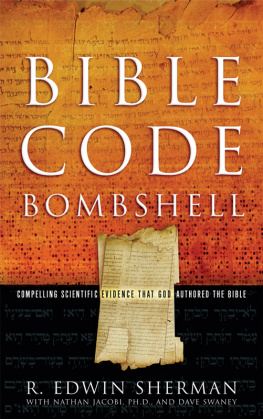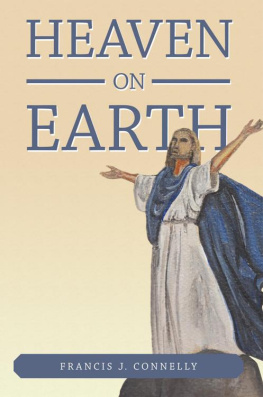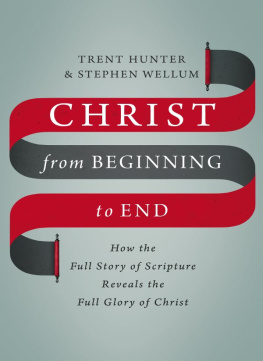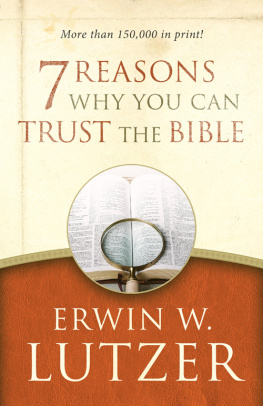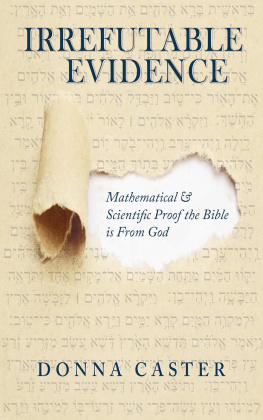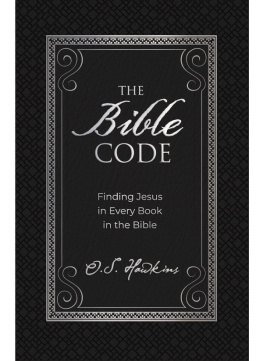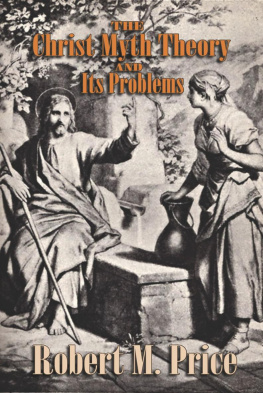First printing: May 2005
Second printing: May 2006
Copyright 2005 by R. Edwin Sherman. All rights reserved. No part of this book may be used or reproduced in any manner whatsoever without written permission of the publisher, except in the case of brief quotations in articles and reviews. For information, write New Leaf Press, P.O. Box 726, Green Forest, AR 72638.
ISBN-13: 987-0-89221-623-9
ISBN-10: 0-89221-623-9
Library of Congress Control Number: 2005925564
Cover design by Left Coast Design, Portland, OR
Unless otherwise noted, all Scripture references are from the Holy Bible, New International Version (NIV) Copyright 1973, 1978, 1984 by International Bible Society. Used by permission of Zondervan. All rights reserved. Other Scripture used from the New King James Version, copyright 1982 by Thomas Nelson, Inc. Used by permission. All rights reserved.
Printed in the United States of America
Please visit our website for other great titles:
www.newleafpress.net
For information regarding author interviews, please contact
the publicity department at (870) 438-5288.
All Scripture Is God-Breathed
2 Timothy 3:16a
Contents
Foreword
Who Wrote the Bible?
Radio astronomers have scanned the heavens for decades for evidence of intelligent life elsewhere in the universe. They have been looking for non-random patterns of sound music or speech rather than just plain noise. Thus far, they have failed to experience anything even close to what Jodie Foster did in the movie Contact.
But now there is convincing evidence that some kind of exceptionally non-random, extraterrestrial communication with earthlings occurred during the writing of the Hebrew Bible not just in the import of its magnificent surface text, but also in the presence of improbably extensive codes embedded beneath that text. What is intriguing is that this should be true for a text that (through various translations) has sold over six billion copies worldwide, according to some estimates.
Who wrote the Bible? Was it a series of desert mystics who conjured up the concept of God to help them cope with life in a savage world? Or was it the result of a faithful recording of the words of God revealed to scribes and prophets over many centuries? Could it be a mixture of these?
For the last two centuries, if not longer, academics have launched a concerted assault on the Bible, seeking to cut it down to the realm of man-penned books. By and large, they have succeeded. Or so they thought.
In 1994, three Israeli scientists introduced Bible codes to the world with an academic paper that startled the mathematically savvy. The paper claimed that the names of the most famous Jewish rabbis and dates of their birth or death were encoded in the book of Genesis, much closer to one another than could be explained by chance. Had the book of Genesis been written by an author who knew the future before any of these rabbis had lived?
Ever since publication of that paper, Bible codes have been under visceral attack. We have witnessed a series of unprofessional displays by reputable scientists, who forcefully asserted half-truths to shoot down straw men of their devising. All claims of valid Bible codes, past or future, must be false, they boldly proclaimed, as if they had any clue as to what evidence might surface in the future. Their attempts to discredit Bible codes have had the savor of desperation about them. Why would that be?
Could it be for motivations similar to those that drove Herod to order the Christ child murdered in His manger? To those that forced prayer out of public schools? Whatever their reasons, code skeptics have been fairly successful in turning much of the public against the concept.
When I first began investigating claims about Bible codes five years ago, I was thoroughly skeptical about them. Nevertheless, the possibility of their potential validity so fascinated me I couldnt walk away from investigating them thoroughly. And the intellectual challenge of deriving the math to test published claims was irresistible to someone who loves solving problems.
For some protagonists in the fray over Bible codes, their own personal opposition to religion evidently motivates them to set aside objectivity and ethics in their efforts to discredit code proponents. My own religious beliefs did not cause me to favor or doubt the purported reality of Bible codes. I have been a Christian for over 30 years, during which time, I have also been a practicing mathematician who has enjoyed a very successful career. Serving as a managing principal with a leading international accounting and consulting firm, and as the president of my own thriving consulting practice, I have served some of the most familiar names in American business and government.
I have never needed codes as proof of my beliefs. These were forged 25 years before I had ever heard of Bible codes. So, from that perspective, whether codes are bunk or real has never made any difference to me.
I will confess that in the last few years I have been partially motivated by my reactions to thinly veiled efforts by non-religious scientists to cut down any efforts to present scientific evidence in support of faith. Let the truth be known, not suppressed. I can be passionate about that.
As our research team has explored the Hebrew Bible, we have been repeatedly blown away by the truly astonishing phenomena we have found within its letters. We have tried to maintain a scientific cool as we communicated these findings on our web site and in a monthly e-newsletter that we have been publishing since 1999.
We have been inundated with code finds, and have often wished for the funding to retain a couple of dozen qualified researchers to pursue the leads that we have found. A number of times in computing the probability that a given code cluster could be due to chance, we reached the point where our Microsoft Excel spreadsheets could go no further. The odds were too overwhelmingly small. The things we found could not be the product of chance. They had to have been placed there purposely. Furthermore, it would be impossible for human beings to have been the originators of it, even using all of the Cray super computers ever built linked together. There is only one intelligence capable of such a feat, and He is commonly referred to as God.
A few free spirits will argue that intensely advanced aliens wrote the Bible. If that were so, why would the literal text itself constantly focus on Gods dealings in human affairs? There is an axiom in logic called Ockhams Razor. It states that when there are two competing hypotheses that could explain something, the simplest and most straightforward one should be chosen. The God hypothesis is the clear choice. When the advocates of alien authorship can come up with some objective way to differentiate alien from divine doings, then the question of authorship might be reopened. Until then, God wins. I, for one, think that if aliens wrote the Bible, codes would largely be bizarre. To the contrary, codes echo the content of the literal text, seemingly affirming it.
This book presents two sub-bombshells the mega-clusters of Isaiah 53 and Ezekiel 37 in support of the main thesis. Each is sufficient to devastate the efforts of code skeptics who have been advancing half-truths in the hope of quelling growing public interest in Bible codes.
When Michael Drosnin, the author of the bestseller The Bible Code, set forth his trivial answers, it was easy for skeptics to derive comparable examples from non-inspired texts. The skeptics are too smart to think they can derive examples from non-inspired texts that might even begin to compare with the mega-clusters from the Bible presented in this book. So they will likely pursue other tactics.

